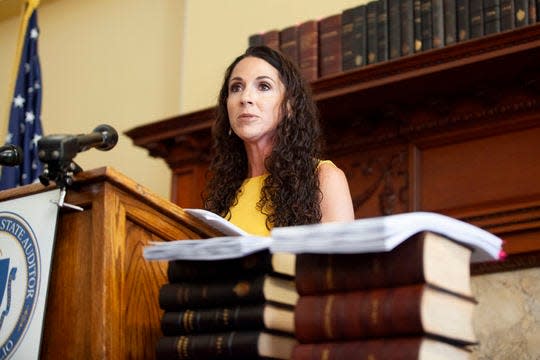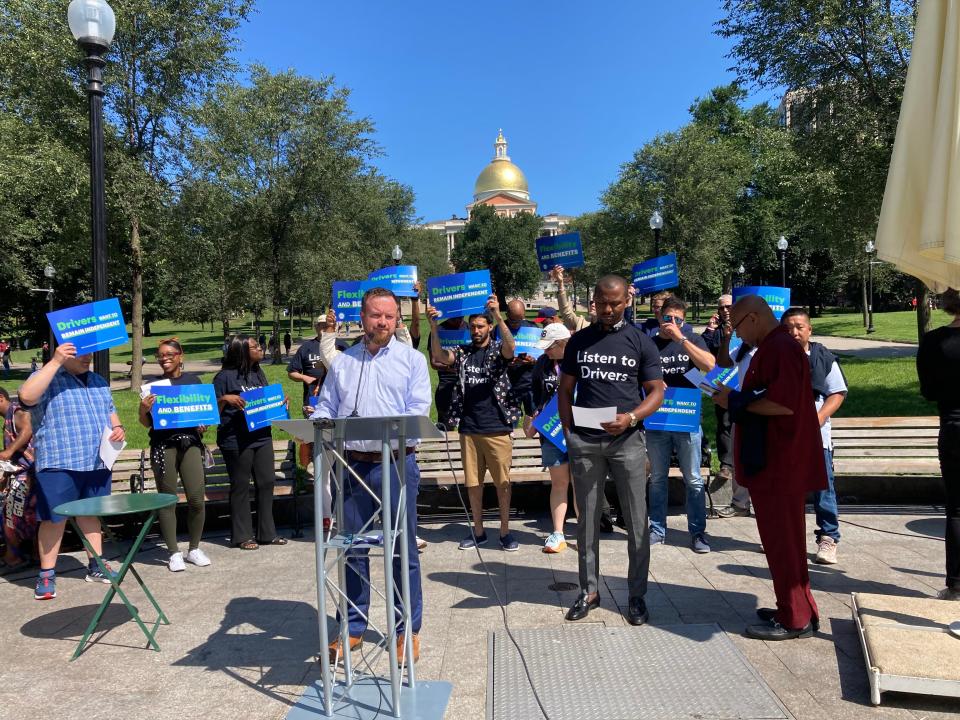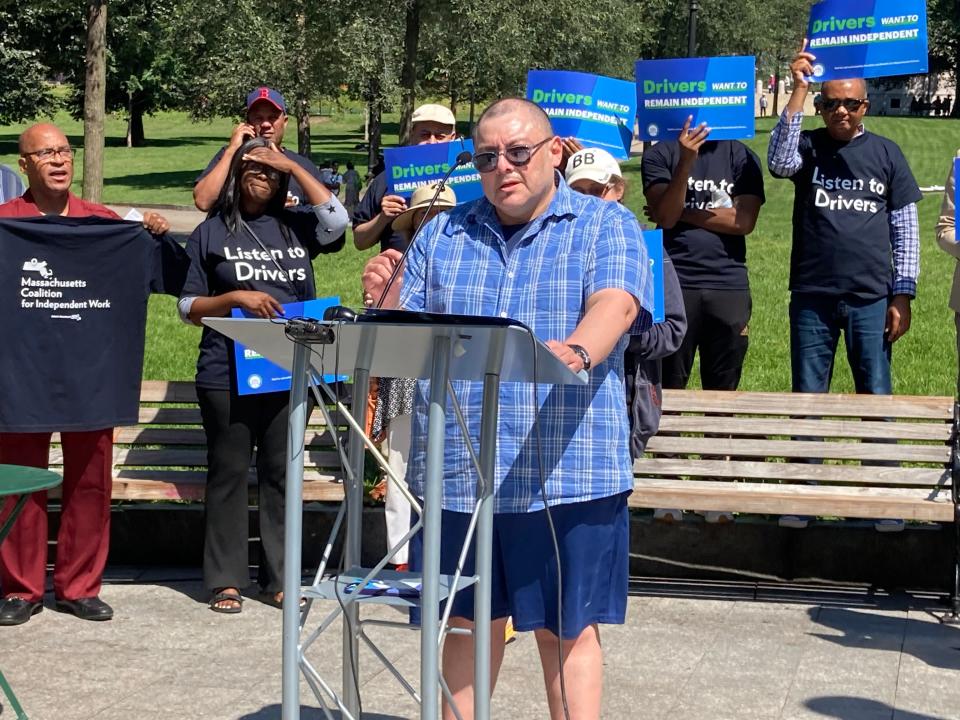What to know about the battle over ride-share drivers status in Massachusetts

The drivers are in agreement as to what they need and want in order to serve their communities as ride-share workers and delivery drivers: Good jobs that afford them the flexibility to set their own schedules and work when they have windows of opportunity.
The difference between them comes down to how those kinds of jobs can be achieved and maintained.
One group, the Massachusetts Coalition for Independent Work, supported by Lyft and Uber, claims the only way to achieve that is by having drivers remain independent contractors.
The opposing group, Drivers Demand Justice, believes that flexibility can be maintained even if drivers are classified as employees and accorded the rights and benefits enjoyed by other Massachusetts workers. They are advocating for the right to unionize.
In the mix are a half-dozen bills filed by legislators that address the issues faced by the ride-share drivers, ballot questions proposed by each of the groups, and a pending lawsuit filed by former Attorney General Maura Healey in 2020, challenging their status as independent contractors.
In the suit, Massachusetts claims the drivers have been misidentified by the app-based tech giants and are actually employees of the companies. A trial date has been set for May 2024 in Suffolk.
Revenue for ride-share companies has increased
Lyft is poised to disclose its second-quarter earnings for 2023 on Tuesday. However, both companies reported revenues in the billions of dollars.

A new entity weighed in July 31. State Auditor Diana DiZoglio announced that her office will conduct an analysis of the impact 200,000 independent contractors have on the state budget.
What's the impact on taxes, unemployment, benefits for workers?
The companies claim the drivers are independent contractors and in doing so workers are not eligible for overtime pay, unemployment insurance or workers’ compensation, among other benefits. DiZoglio's office will review and analyze the impact these companies have on state unemployment insurance and workers’ compensation systems.
“Equally important in our analysis are the impacts these classifications have on workers,” said a spokesperson for the office. “We will certainly be examining what other states have found to see if there are tangible, quantifiable effects that we can learn from.”
A similar analysis conducted in New Jersey and reported last fall resulted in a $100 million payment from Uber to make up for missing contributions to the state’s unemployment funds. Of that amount, $12 million was assessed as a penalty.
New Jersey has almost 300,000 drivers, while Massachusetts has about 200,000.
The analysis by the auditor’s office is just in the beginning phases, said the spokesperson, adding that it is “our hope that this report will be helpful to policymakers, those directly impacted by this classification, and all Massachusetts taxpayers.”

The Massachusetts Coalition for Independent Work has filed nine versions of its proposed ballot question with the attorney general’s office for review following the failure of its proposed question in the last election cycle. That question was nixed by the state Supreme Judicial Court during the summer because it failed to adhere to the necessary ballot initiative format.
The group Massachusetts is Not For Sale, active in the 2022 ballot question fight, issued a statement Wednesday regarding the new attempt to put the classification of app-based workers on the ballot in 2024.
“No company should be exempt from our laws providing workers with robust protections and benefits, and Massachusetts should strengthen those laws, not weaken them,” according to the statement. “The Uber and Lyft-led group behind (Wednesday’s) announced ballot initiative is attempting to do exactly that — buy themselves an exemption from the law, leaving riders and drivers at risk while asking taxpayers to foot the bill. Massachusetts has always held and will continue to hold companies accountable for violating the law.”
Both groups file their own ballot question suggestions
In its ballot question, the coalition suggests that drivers remain independent. Not included in every version of the question submitted for review, but offered at rallies and as part of its literature, the group proposes that the app-companies like Uber and Lyft establish a base pay rate of $18 an hour, offer drivers health care vouchers and job-related accident insurance.
Drivers Demand Justice also filed paperwork that would put a question on the ballot. However, the group is more focused on companion bills that would create a framework in Massachusetts that would allow drivers to form a union.
Drivers have indicated that the union is necessary to have a voice in the company, to serve as an intermediary when they are deactivated with no explanation for the move, and to negotiate benefits such as base pay, paid vacation and sick time.
“We talked to hundreds of drivers; what they want is to have good jobs,” said Roxana Rivera, of Drivers Demand Justice, who serves as the assistant to the president of 32BJ SEIU, the union working to organize the drivers.
“Many of the drivers have been working their jobs for years only to see their take-home pay decrease,” Rivera said, adding that the drivers also complain about unfair deactivations that block them from the app without due process. Getting blocked from the app means they cannot work at all.
“That’s a big issue,” Rivera said, adding that drivers do not have an avenue for redress — the drivers are dealing with an application. “The drivers want due process.”
Disagreement over why some drivers are deactivated
Others counter that blocked drivers have only themselves to blame — they may have acted in a way that merits their deactivation.
“Lyft and Uber are just removing those drivers who have committed crimes within the platform,” said Octavio Mejia Suarez, a driver working in Allston-Brighton who supports the drive to remain independent, with the proposed benefits being offered through the ballot question by the tech companies.

However, other drivers have complained that they were deactivated because “the customer may have thought I was ugly, or didn’t rate me high enough,” said Sergio Morales of Jamaica Plain. “We have no one to talk to, no way to get back on the road.
“We need someone to advocate for us,” Morales said. “The union will speak up for us.”
Drivers also want acknowledgement that they use their own funds to maintain their cars, pay for gas, insurance and incidentals. In discussion with drivers, the union organizers learned that the driver’s share of the payment for the ride has decreased from about two-thirds to less than half, even as little as a third of the payment.
“The only way to change things is through collective bargaining,” Rivera said. “At the end of the day, what workers want is to be able to make ends meet.”
This article originally appeared on Telegram & Gazette: Contractor or employee? Battle over ride-share drivers in Mass.

